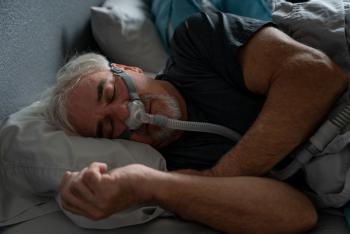Sleep apnea, a common sleep disorder characterized by interruptions in breathing during sleep...
Read MoreEffective Monday, January 5th, Inspira Health is now at Yellow Alert Status: Masks for staff, patients and visitors in all high-risk areas across our facilities are strongly recommended.

Chronic snoring is a lot of things––mostly disruptive to the person lying awake next to it. But it’s not always a person’s first inclination to think of snoring as a symptom. Snoring can be harmless and common in people due to things like sleep position and mouth anatomy, but it can also signal a serious health problem, including obstructive sleep apnea.
There are a few types of sleep apnea, a sleep disorder that causes a person’s breathing to repeatedly stop and start. Obstructive sleep apnea is the most common form that occurs when the throat muscles relax, which can partially or completely block your airway during sleep.
When an apnea event occurs, the brain is signaled to partially awaken so that it can signal to the body that it needs to breathe. A loud gasping, choking or snorting sound follows, which is the body’s way of fighting the blockage enough to return to sleep. For someone with obstructive sleep apnea, these episodes of breathing interruptions can happen anywhere from five to 30 times per night depending on the severity of the condition.
Loud snoring is one of its hallmark symptoms, but other signs and symptoms include awakening with a dry mouth, morning headache, difficulty staying asleep, excessive daytime sleepiness and irritability. If you share a bed with someone who experiences these symptoms during the night, let them know because symptoms may not be as obvious to them when they’re awake.
Besides getting a poor night’s sleep, obstructive sleep apnea can create a strain on the heart. Individuals with obstructive sleep apnea are more likely to have higher blood pressure and risks of heart attack and stroke.
Obstructive sleep apnea is more common for individuals who are overweight or obese, or those who have larger-than-average tonsils or excess tissue at the back of their throat. Other risk factors include smoking, diabetes, high blood pressure or being already at risk for heart failure or stroke. The condition is more common among men than women.
If you believe you may be experiencing episodes of breathing interruptions at night, your doctor may want you to complete a sleep study to better understand your shut-eye habits. Depending on the severity of your apnea, you may be advised to wear a CPAP machine at night that corrects your apnea by forcing constant and continuous air through the nose or mouth to keep the upper airway clear during sleep.
If you are experiencing any of these symptoms or are concerned about your sleep habits impact on your hearts health, call the experienced cardiologists with Cardiac Partners at Cooper and Inspira at 833-SJ HEART (833 754-3278).

Sleep apnea, a common sleep disorder characterized by interruptions in breathing during sleep...
Read More
Mouth taping is a practice that promotes nasal breathing during sleep, which may improve sleep...
Read More
Learn about how transcarotid artery revascularization (TCAR) compares to traditional treatments like...
Read More